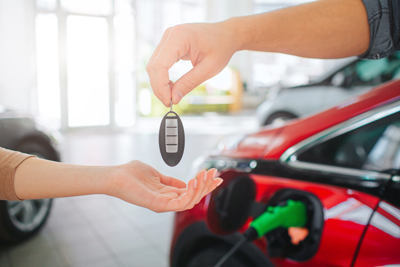Change is hard. Humans are creatures of habit and it's in our nature to avoid change. Transitioning our personal transportation fleet from vehicles that burn fossil fuels to plug-in electric vehicles is going to be a massive undertaking.
And as with all new disruptive technologies, there will be winners and losers, as the old tech is shuttered while the new technology proliferates. The oil and gas industry already knows electric vehicles are poised to replace the internal combustion engine vehicles it caters to, and the demand for its products will radically decrease in the coming years.
But that doesn't mean they aren't going down without a fight.
Wyoming just introduced state legislation with the hopes of phasing out the sale of EVs in the state by 2035. The legislation sponsor, Sen. Jim Anderson, R-Casper, told Cowboy State Daily the reason he introduced the resolution was "to push back against bans on new sales of cars with internal combustion engines in states like California and New York."
"Whereas, the United States has consistently invested in the oil and gas industry to sustain gas-powered vehicles, and that investment has resulted in the continued employment of thousands of people in the oil and gas industry in Wyoming and throughout the country..." the resolution reads.
The resolution, “Phasing Out New Electric Vehicle Sales By 2035,” was introduced Jan. 13, and already has strong support from members of the Wyoming House of Representatives and Senate.
However, as with everything, the devil is always in the details. Once you read through the resolution and get to sections one and two at the bottom, you can see this is more of a symbolic gesture than an outright ban.
Section 1 reads, "That the legislature encourages and expresses as a goal that the sale of new electric vehicles in the state of Wyoming be phased out by 2035," while Section 2 reads, "That the legislature encourages Wyoming's industries and citizens to limit the sale and purchase of new electric vehicles in Wyoming with a goal of phasing out the sale of new electric vehicles in Wyoming by 2035."
The resolution is basically encouraging Wyoming residents and businesses not to buy or sell electric vehicles with the goal of eliminating them completely by 2035. But why? Why does Wyoming care if people switch to electric vehicles?
Wyoming cares because it is an oil and gas state. Even though Wyoming is the least populated state in the nation, with only a little more than half a million residents---0.17% of the U.S. population---it is the eight-largest oil producer in the U.S.
The resolution spells out how the oil and gas industry employs thousands of Wyoming residents and the transition to electric vehicles threatens their continued employment. Reading through the document, one can feel the anxiety the sponsors have about the electric future.
It also has its fair share of fear-mongering as it predicts an impending disaster because "...the critical minerals used in electric batteries are not easily recyclable or disposable, meaning that municipal landfills in Wyoming and elsewhere will be required to develop practices to dispose of these minerals in a safe and responsible manner."
It is true that eventually, EV batteries will need to be replaced and disposed of once they are at the end of life. However, the minerals used in EV batteries are very valuable and won't end up in landfills; they will be recycled. As much as 90% of today's EV batteries are made to be recycled, and there are companies being established across the globe to handle that task.
This resolution may be more tongue-in-cheek than a serious piece of legislation, but it brings light to a serious issue for Wyoming. Electric vehicles are coming. It really doesn't matter whether or not states ban internal combustion vehicles because, in 10 to 15 years' time, very few people will want to buy one---and that includes most Wyoming residents.
Instead of trying to fight the inevitable, Wyoming lawmakers need to begin to plan for an economic future that relies more heavily on other industries. They know they have to, and perhaps this stunt was really designed to get the attention of those in the federal government who can help with that.












